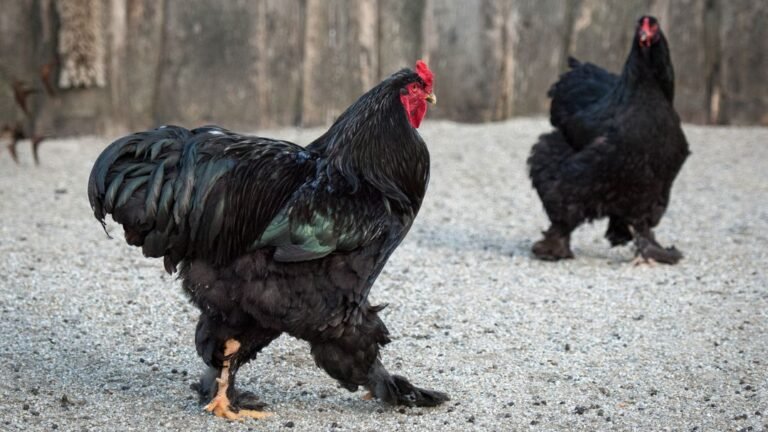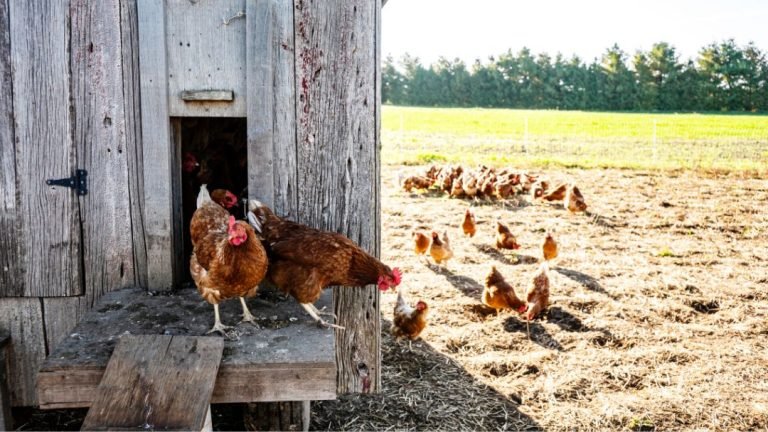Chickens may eat their own eggs due to nutritional deficiencies or stress factors. This behavior is typically exhibited when the chickens lack sufficient nutrients or when environmental stressors disrupt their normal nesting behavior.
Chickens, like many other animals, rely on a balanced diet to meet their nutritional needs. Eggs are a good source of protein and other vital nutrients. When chickens do not receive adequate nutrition from their regular feed, they may resort to consuming their own eggs as a means to supplement their diet.
Stressful conditions can also contribute to egg-eating behavior. Chickens may become anxious or bored, leading them to peck at their eggs. In some cases, overcrowded or unsanitary conditions can also increase the likelihood of egg-eating.
Understanding the reasons behind this behavior can help chicken owners implement preventive measures to address nutritional deficiencies and create a stress-free environment for their flock.
Understanding The Prevalence Of Egg Eating In Chickens
Chickens are fascinating creatures known for their egg-laying abilities. However, at times, they may exhibit a rather perplexing behavior of consuming their own eggs. This phenomenon, known as egg eating, has been observed in various breeds of chickens and can have implications for chicken owners and egg production.
Let’s delve into the factors contributing to this behavior and explore its implications.
Factors Contributing To Egg Eating Behavior
- Insufficient nutrition: Chickens may resort to eating their eggs if they lack essential nutrients like calcium and protein in their diet. Their instinctual drive for nutrients can lead them to consume their own eggs as an alternative source.
- Environmental stress: When chickens are subjected to overcrowding, lack of environmental enrichment, or insufficient nesting spaces, they can become stressed. This stress may trigger egg-eating behavior as a coping mechanism or out of boredom.
- Eggshell quality: Thin or weak eggshells are more prone to breakage, making them easily accessible to chickens. Once an egg is accidentally broken, chickens may develop a taste for the contents, which can lead to habitual egg eating.
- Nesting disturbances: Disturbances during the egg-laying process, such as loud noises, sudden movements, or other disturbances in the coop, can startle the hens. This stress may cause the hens to accidentally break their own eggs, sparking the egg-eating behavior.
Implications For Chicken Owners And Egg Production
- Decreased egg production: Egg eating can significantly impact egg production, as precious eggs are lost to the chickens’ consumption. This can be frustrating for chicken owners who rely on a steady supply of eggs.
- Contamination risks: Eating eggs can create a potential health hazard for the flock. Consuming broken eggs can expose chickens to harmful bacteria, leading to infections and illnesses.
- Cost implications: Egg eating not only affects egg production but also raises costs for chicken owners. The expenses of providing additional nutrients or purchasing replacement eggs can accumulate over time.
The Role Of Breed And Age In Egg Consumption
Some breeds of chickens may be more prone to egg-eating behavior than others. Additionally, the age of the chicken can influence the likelihood of engaging in such behavior.
- Breeds: Certain breeds, such as Sussex and Rhode Island Reds, have been observed to have a higher propensity for egg-eating. Being aware of breed predispositions can help chicken owners take preventive measures or adjust their management strategies accordingly.
- Age: Young chickens, especially those that have just started laying, may accidentally break their eggs due to inexperience. This can trigger egg-eating behavior, which may or may not continue into adulthood.
Understanding the factors contributing to egg-eating behavior, its implications for chicken owners and egg production, as well as the role of breed and age can help mitigate and prevent this phenomenon. Implementing appropriate nutrition, providing suitable nesting environments, and minimizing stressors can help maintain a healthy and productive flock.

Uncovering The Reasons Behind Egg Eating Behavior
Discover the underlying causes of chickens consuming their own eggs and gain insights into the reasons behind this perplexing behavior. Delve into the factors triggering egg-eating behavior in poultry.
Chickens are fascinating creatures with unique behaviors, and one such behavior is the consumption of their own eggs. It may seem perplexing and even distressing to witness, but there are underlying reasons behind why chickens engage in this unusual behavior.
In this section, we will uncover the various factors that contribute to egg eating in chickens and explore how to manage and prevent this behavior.
Managing Stress And Boredom In Chickens
Stress and boredom are significant factors that can drive chickens to eat their own eggs. When chickens are bored or experiencing stress, they may turn to egg consumption as a way to alleviate their feelings of restlessness or to seek stimulation.
To minimize stress and boredom in chickens:
- Provide ample space for chickens to roam and exercise freely.
- Offer a variety of enrichments within their environment, such as perches, hay bales, and dust baths, to keep them mentally and physically stimulated.
- Maintain a calm and peaceful environment, avoiding loud noises or sudden disturbances that could stress the chickens.
Impact Of Poor Nutrition On Egg Consumption
Nutritional deficiencies can also contribute to chickens eating their own eggs. When chickens lack essential nutrients in their diet, they may resort to consuming their eggs as a way to replenish those missing nutrients.
Ensure chickens have a well-balanced diet:
- Provide a commercially formulated feed that meets their nutritional needs.
- Supplement their diet with appropriate vitamins and minerals if necessary.
- Offer calcium-rich foods like oyster shells or crushed eggshells to fulfill their calcium requirements, reducing the likelihood of them seeking calcium from their own eggs.
The Influence Of Overcrowding And Lack Of Nesting Options
Overcrowding and limited nesting options can lead to egg-eating behavior in chickens. When chickens do not have enough space or comfortable nesting areas to lay their eggs, they may accidentally break or crack them, triggering the instinct to consume the broken eggs to prevent waste.
To prevent overcrowding and encourage proper nesting:
- Provide enough nest boxes for all the hens, with a recommended ratio of one nest box per five to six hens.
- Ensure the nest boxes are clean, cozy, and secluded, mimicking a natural nesting environment.
- Regularly collect eggs to prevent accidental breakage and reduce the chances of chickens eating their eggs.
By understanding the underlying reasons behind egg-eating behavior in chickens, we can implement effective strategies to manage and eliminate this habit. By addressing stress and boredom, providing a well-balanced diet, and ensuring suitable nesting options, we can promote healthier and more productive chicken flocks that abstain from consuming their own eggs.
Remember, a happy and well-cared-for chicken is less likely to resort to such behavior.
Strategies To Prevent And Address Egg Eating
Chickens eating their own eggs can be a frustrating issue for poultry owners. Not only does it result in lost eggs, but it can also encourage this behavior among other chickens. To prevent and address egg eating, there are several strategies you can implement.
Providing Appropriate Nesting Boxes
- Ensure that your chickens have suitable nesting boxes to lay their eggs in. This will help protect the eggs from being damaged or broken, reducing the likelihood of the chickens eating them.
- Use nesting boxes that are dark and secluded, as this creates a more comfortable and private environment for the hens to lay their eggs.
- Place soft nesting materials, such as straw or wood shavings, in the nesting boxes to cushion the eggs and make them less likely to break.
Diet Adjustments To Deter Egg Eating
- Make sure that your chickens are receiving a nutritionally balanced diet. A lack of certain nutrients, such as calcium or protein, can lead to egg-eating behavior.
- Consider providing additional calcium sources, such as crushed oyster shells or eggshells, to ensure your hens have enough calcium for strong egg formation. This can help reduce the urge to eat their own eggs.
- Avoid feeding your chickens excessive amounts of high-protein foods, as this can increase the chances of them developing egg-eating tendencies.
Utilizing Decoy Eggs And Deterrents
- Place decoy eggs, such as golf balls or ceramic eggs, in the nesting boxes to fool the chickens. This can help deter them from pecking at real eggs.
- Apply deterrents, such as bitter apple spray or mustard, to the eggs. The unpleasant taste and smell can discourage chickens from eating their own eggs.
- Regularly check the nesting boxes for any broken or damaged eggs. Promptly remove these eggs to prevent the chickens from developing a taste for them.
- Collect the eggs frequently and avoid leaving them in the nesting boxes for extended periods. This reduces the opportunity for chickens to eat their own eggs.
Implementing these strategies can help discourage egg-eating behavior among your chickens. By providing appropriate nesting boxes, adjusting their diet, and utilizing decoy eggs and deterrents, you can protect your egg production and maintain a healthy flock.
The Importance Of Early Intervention And Training
Chickens are known to eat their own eggs, and as poultry owners, it’s essential to address this behavior promptly. Early intervention and training can make a significant difference in breaking this habit and ensuring the overall health and productivity of your flock.
In this section, we will explore the significance of recognizing the signs of egg eating, effective techniques for correcting the behavior, and the importance of consistency and patience in retraining chickens.
Recognizing The Signs Of Egg Eating
- Eggshell debris in the nesting boxes or coop.
- Accumulation of sticky yolk residue on eggs.
- Distressed or aggressive behavior towards other hens in the flock.
- Increased interest in pecking at eggs and spending excessive time in nesting boxes.
Effective Techniques For Correcting The Behavior
- Collect eggs frequently: Regularly removing eggs from the nest boxes minimizes the opportunity for chickens to engage in egg-eating behavior.
- Provide appropriate nutrition: Ensure your hens are receiving a balanced diet with sufficient calcium and protein, as deficiencies can lead to egg-eating.
- Provide adequate nesting materials: Soft nesting materials, like straw or wood shavings, can help cushion eggs and reduce the chances of breakage.
- Use decoy eggs or golf balls: Placing artificial eggs in the nesting boxes can discourage chickens from pecking and breaking real eggs.
- Modify the nesting boxes: Consider modifying the design to create a more secluded and protected environment for hens to lay their eggs.
- Apply taste deterrents: Coating eggs with substances like mustard or hot sauce can deter hens from pecking and consuming them.
Consistency And Patience In Retraining Chickens
- Be consistent in egg collection and maintaining a clean nesting area.
- Monitor the flock closely for any signs of egg eating and address the behavior immediately.
- Use positive reinforcement and reward hens for appropriate behavior, such as laying eggs without damaging them.
- Avoid punishing or scaring the chickens, as it may lead to more stress and worsen the egg-eating behavior.
- Have patience, as breaking this habit may take time and require repeated efforts.
By recognizing the signs of egg eating, implementing effective techniques for correction, and practicing consistency and patience, you can successfully intervene and train your chickens to abstain from consuming their own eggs. Remember, early intervention is key to maintaining the productivity and well-being of your flock.
Conclusion
It’s not uncommon for chickens to eat their own eggs, and there are a few reasons behind this behavior. One possibility is that the chickens have a calcium deficiency, leading them to seek out the nutrients found in the eggs.
Another reason could be stress or overcrowding in the coop, causing the chickens to become bored or anxious and resort to pecking at their eggs. Additionally, if the eggs are not being collected regularly, the chickens may view them as a food source.
To prevent this behavior, it’s important to provide a balanced diet for the chickens and ensure they have enough space in their living environment. Collecting eggs regularly and providing appropriate nesting areas can also help deter egg eating. By understanding the reasons why chickens eat their own eggs, you can take steps to prevent this behavior and promote a healthier and more productive flock.




